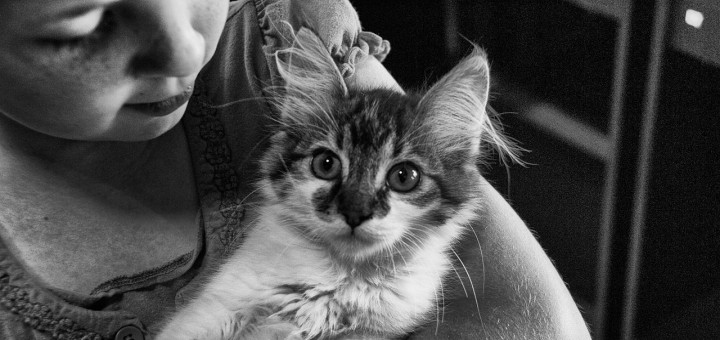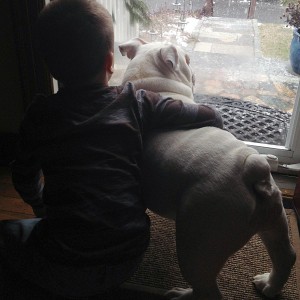Pets and kids are usually a no-brainer. Bringing home a fur baby is considered the ultimate way to teach a child responsibility, provide companionship and cuddles, and generally improve life at home. What about when your child has special needs though? There is actually a lot to consider before buying a pet for a child with autism, ADHD or other developmental disabilities, but most of the advice out there points to this being a great idea, so long as you choose the right breed, and follow good advice. A google search will get you on the right track, include the exact disorder or disability you’re dealing with, and if you have an idea of what animal or breed that too.
There’s a lot of research already available about how a pet can help reduce experiences of stress and anxiety, and increase empathy in normal functioning children and adults, but what about children with autism, ADHD or other conditions? There’s good news, as everything from motivation, concentration and how fast children perform tasks to the basics of an established routine, responsibility, communication and interactive play as well as levels of calm can all be enhanced by bringing a pet home. Studies are very limited, and this area of research is new, but it is safe to say that there could be some way your child may benefit.
Cat or dog? It depends…
Whether you want to go with a cat or dog might depend on how much time you have to devote to caring for the animal and training (dogs require a lot more than cats when it comes to training and daily walks). What condition you’re dealing with matters too – as children with sensory processing issues or disorders, or certain cases of anxiety may not react well to the pitch of a dog’s bark, for example. Where they are on the autistic scale, and any other health issues such as allergies are important factors too.
Scheduling can be another issue, as a busy, chaotic family household may realistically be more suitable to a cat, or a small lap dog only rather than a retriever or lab. The upside of this, if your child is the right age and responds well, is that a dog is the perfect way to instill a sense of scheduling into their lives, and the consequences that come when the schedule is put out of whack.
There are a number of scholarly articles, written by psychologists and vets or animal carers alike, and they mostly agree that before deciding on a pet, as the adult or carer, it’s up to you to decide whether you are willing to go through the process of training and assisting the child. They will need to learn about caring for a specific breed of dog, for example and what’s involved, but obviously someone has to be prepared to supervise and pick up any shortfalls.
It’s up to you to ensure that the puppy’s welfare is looked after whether or not the child is doing everything they’re supposed to for them (i.e no missing feeds, leaving mess around or refusing to walk the dog simply because the child won’t do it).
Where to get a pet for my autistic/ADHD child?
When it comes to finding a suitable pet for a developmentally disabled child, it’s important to consult reputable breeders and organisations in your own area. Try forums such as meetup and facebook to join groups in your area and get the right information. If one doesn’t exist you can always start something there too.
Try the local association for assistance dogs, and counseling services or Pets as Therapy organisations. A shelter dog or cat might be feasible but you would need to invest a lot into training and researching the breed first. Wherever you get your pet from, it is a great idea to stay connected to a local organization that you can turn to for expert help and advice when it comes to training and challenges that will come up introducing your pet to the household. It could be that your child takes perfectly well to the new arrival, but another family pet might need help adjusting, or the whole family might need to learn training tricks to make sure progress is not hindered by negative reinforcement or habits that aren’t constructive.
What if it doesn’t work out?
If you’ve brought a pet home and things have not worked out, there’s no need to abandon the animal or continue tearing your hair out. First search for some expert trainers who might be able to work with your animal, your child and the whole family and see if things can improve. If all else fails though, make sure you find a no kill shelter or another loving family to take the animal. This is a serious commitment for everyone involved, and no one should end up worse off for trying out a pet.
There is certainly a lot to consider before bringing a pet into the family if you have an autistic or otherwise developmentally disabled child, but the rewards can be huge for your child, your family and the animal itself if you do it right, so it’s well worth considering.
Author Bio: Kalianna Dean is owner and co-founder of www.maxandmason.com, an online pet store for classy cats and dapper dogs. Her interest in animals extends far beyond just what they wear though, and she actively studies all aspects of animal health and animal behavior to make life as sweet as possible for her two cats Max and Mason (the inspiration behind the site), and pets all over the world. Checkout Max and Mason on Instagram (@maxiandmason), facebook (https://www.facebook.com/MaxiandMason?ref=tn_tnmn) or twitter (@maxiandmason). Sign up for the newsletter on the site to get your first order discount.
Pressplay Pets a blog for the modern age pet parent interested in health & care, news, reviews & personal accounts of unconditional love & at times heartfelt pain of pet parenting!
Follow Us!





